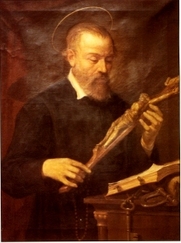
In those days there came to Venice blessed Cajetan and Peter Carafa, who was afterwards Paul IV. They were pleased with the spirit of Jerome, and with his new Asylum for Orphans, and took him to the Hospital for Incurables, as well to bring up orphans, as to extend his charity equally to the sick. Soon after, by the advice of the same, he went to the mainland, and built orphanages first at Brescia, then at Bergamo and Como. His chief foundations were at Bergamo, where besides an orphanage for little boys, and another for little girls, he opened an house of refuge for repentant harlots, being the first institution of that kind in that part of the world. In the end he went to dwell at Somasca, a hamlet in the district of Bergamo, close to the frontiers of the Venetian territory, and there made an house for himself and his disciples, and gave shape to a congregation, which is generally called the Congregation of Somasca. This congregation grew and spread, and found its work not only in the education of orphans and the service of Churches, but also in a wider usefulness to the Christian Commonwealth, by training up young men in letters and good manners. Holy Pius V enrolled it among the religious Orders, and other Popes have given it divers privileges.
Jerome went to Milan and to Ticino to gather orphans together, and in both places he gathered a multitude of little boys for whom the charity of noblemen enabled him to provide board, lodging, clothes, and schooling. He returned to Somasca, and, still making himself all things to all men, refused no toil by which he saw that could be of any use to his neighbour. He was used to go about in the field, helping the reapers in their work, and meanwhile teaching them in the mysteries of the faith. He was very patient in cleansing and healing the heads of little boys foul with lice, and proved so successful a physician to the stinking sores of the poor country people, that he got a reputation for having the gift of healing. He found a cave in the mountain which hangs over Somasca, and there he would hide himself, passing whole days without meat or drink, and oftentimes scourging himself, continuing in prayer long into the night, and taking his short sleep upon the bare rock, in expiation of his own sins and the sins of others. In the far end of this cave, there drippeth out of the dry stone some water, which is said by an unwavering tradition to have come there at the prayers of the man of God. It droppeth freely even to this day, and is taken to divers places at a distance, where it often hath an healing effect upon the sick. At length an infectious disorder broke out in all the valley, and Jerome, who nursed the sick and carried the dead to burial on his own shoulders, caught it, and died a precious death, as he had himself foretold, in the fifty-seventh year of his age, and that of salvation 1537. He was famous for many miracles, both during his life and after his death; Benedict XIV solemnly enrolled his name among those of the Blessed, and Clement XIII inserted it in the Calendar of the Saints.




